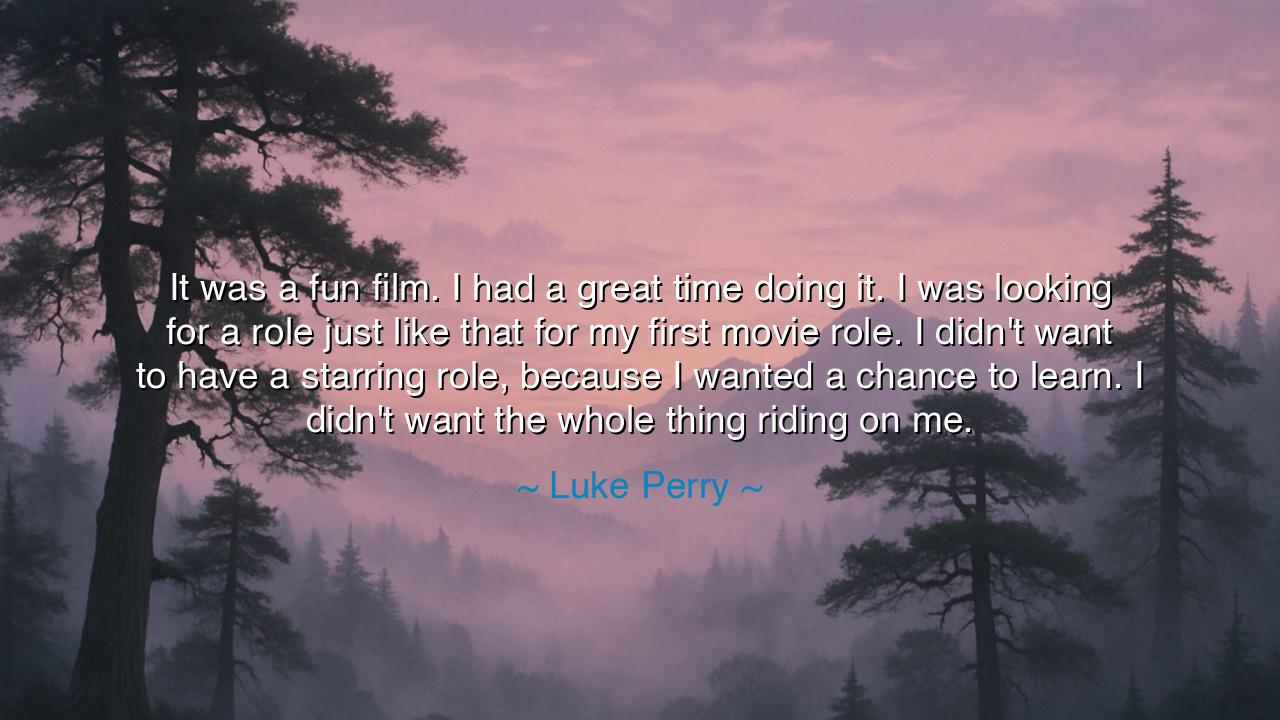
It was a fun film. I had a great time doing it. I was looking for
It was a fun film. I had a great time doing it. I was looking for a role just like that for my first movie role. I didn't want to have a starring role, because I wanted a chance to learn. I didn't want the whole thing riding on me.






In the grand odyssey of life, there are moments when we find ourselves stepping onto a new stage, uncertain but full of hope and promise. These are the moments when the weight of expectation can feel overwhelming, and we must choose whether to rise to the challenge or to approach it with humility and grace. Luke Perry, a man who navigated the complexities of fame and artistry with sincerity, once reflected on his early career: "It was a fun film. I had a great time doing it. I was looking for a role just like that for my first movie role. I didn’t want to have a starring role, because I wanted a chance to learn. I didn’t want the whole thing riding on me." These words, though simple, contain a profound truth about the journey of growth—a lesson in the importance of humility, patience, and the wisdom of choosing the right path for self-development.
The pursuit of greatness, whether in the arts or in any other realm of life, is often laden with temptations and expectations that push us toward the spotlight. The world constantly beckons with promises of fame and glory, offering us the chance to be the center of attention. Yet, Luke Perry knew the value of learning over instant success. By choosing not to chase the lead role in his first film, he recognized that there was much to be gained from standing in the shadow of others—learning from their experience, soaking in the nuances of the craft, and gradually refining his own skills. This is a lesson that can be found in the teachings of the ancients, where the pursuit of knowledge and wisdom was often regarded as a journey that required patience, discipline, and a willingness to grow step by step.
In the story of Socrates, we see the embodiment of this principle. Socrates, one of the greatest philosophers of all time, did not set out to teach the masses or claim a title of honor. Instead, he spent years questioning, listening, and learning. He would often say that he was wise only in that he knew how little he knew. Socrates understood that true wisdom did not come from being the loudest voice in the room, but from listening deeply, from experiencing life in its smallest details, and from refining one’s character over time. In choosing to play a smaller role in his first film, Luke Perry echoed this ancient wisdom—recognizing that there is great value in learning through experience, in humbling oneself before the task at hand rather than rushing toward the limelight.
The heroic tales of old, too, often emphasize the importance of humility and learning. Take, for example, the legendary King Arthur, who, though destined for greatness, did not begin his journey as a ruler. He was raised in obscurity, learning the ways of life before he became the wise and just king of Camelot. Arthur’s wisdom and strength as a leader were not forged through immediate glory but through the time he spent learning from others—gaining wisdom, humility, and patience as he grew into his role. Luke Perry’s decision to embrace a role with fewer expectations mirrors this approach: he understood that growth is a process, and that it is through the quiet moments of learning that we are prepared for the great responsibilities that may come in the future.
In the modern world, where the pressure to achieve success quickly is ever-present, Perry’s words are a reminder to us all of the value of patience and gradual development. So often, we rush toward instant fame or success, driven by the allure of external validation. But the true path of mastery and fulfillment lies not in jumping to the front of the stage, but in taking the time to hone one’s craft, to learn from those who came before us, and to build a solid foundation. Perry’s reflection is not a rejection of ambition, but an acknowledgment of the wisdom of starting humbly, of stepping into a role that allows for growth, and of recognizing that learning must come before leading.
The lesson here is clear: growth is not about claiming the spotlight before we are ready. It is about embracing humility, learning from others, and building a foundation that will support the weight of future responsibilities. Whether you are starting in a new career, embarking on a personal journey, or stepping into any new role, remember that patience is as much a part of success as action. Seek the opportunity to learn from those around you, to grow quietly and steadily, and to build your strength over time. It is not the role we are given that defines us, but the way we approach it—with humility, dedication, and an unwavering commitment to the long path of growth.
So, in your own life, take Luke Perry’s wisdom to heart. When you face new challenges or embark on new endeavors, resist the temptation to seek the immediate spotlight. Instead, choose the path of learning, where the goal is not just to be seen, but to become stronger, wiser, and more capable. Be patient with yourself and recognize that the road to true mastery is one of steady, deliberate steps, not leaps into the unknown. And in the end, when the time comes for you to step into your moment of greatness, you will find that your foundation is solid, your skills are honed, and your journey has prepared you for the heights you are destined to reach.






AAdministratorAdministrator
Welcome, honored guests. Please leave a comment, we will respond soon